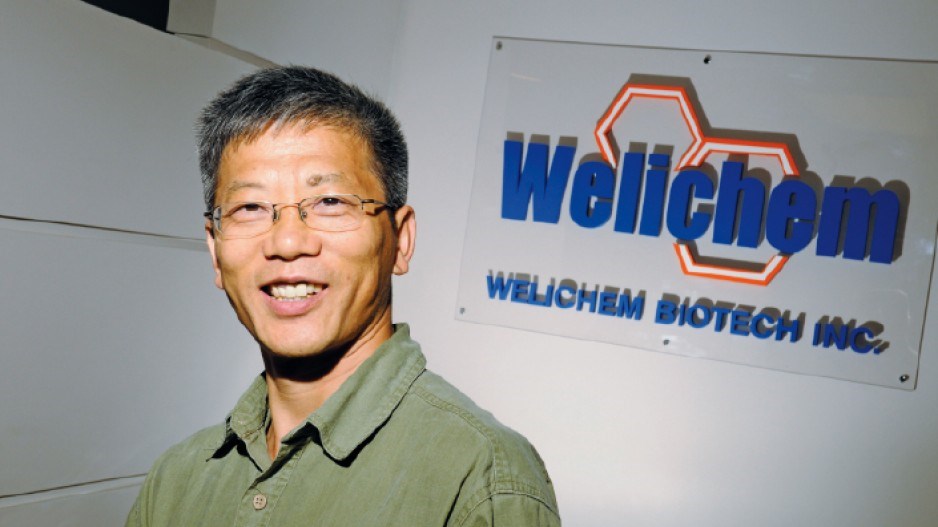News that pharmaceutical giant GlaxoSmith Kline (GSK) has agreed to pay Vancouver-based Welichem Biotech Inc. up to $230 million for rights to a psoriasis cream is welcome news for the local life sciences sector, which has been battered with layoffs, restructurings and sagging stock prices.
Welichem’s (WBI:TSX-V) board on July 31 approved selling intellectual property rights for the cream in most of the world to GSK (NYSE:GSK) subsidiary Stiefel for a $35 million up-front payment and the potential for another $180 million in milestone payments if future clinical trials and commercialization meet expectations.
In 2004, Welichem sold the rights to its worm bacteria–based treatment (see sidebar) within China, Taiwan, Macau and Hong Kong for more than $1 million to Shenzhen Celestial Pharmaceuticals Ltd. and Beijing Wenfeng Tianji Pharmaceuticals Co. Ltd.
GSK has agreed to pay Welichem another $15 million if it is able to reacquire rights to the product in those territories and then transfer those rights to GSK.
GSK is not planning on simply buying those rights directly.
“GSK wants Welichem to do the work,” explained Fasken Martineau partner Roger Kuypers, who chairs his law firm’s biotechnology and life sciences practice group and was involved in the deal.
“Welichem has a relationship with those companies and has the contacts to make [reacquiring rights for the cream in China, Macau, Hong Kong and Taiwan] happen.”
The transaction comes as B.C.’s biotechnology scene has been mired in bad news.
Cardiome Pharma (TSX:COM) chopped 78 of its 92 employees in July after losing pharmaceutical giant Merck (NYSE:MCK) as a partner earlier in the year.
QLT Inc. (Nasdaq:QLTI) followed suit, chopping 146 staff, reducing its head count from 214 to 68, also in July.
Meanwhile, former biotechnology darling Angiotech Pharmaceuticals Inc., which along with QLT and Aspreva Pharmaceuticals Corp. are the only B.C.-based biotechnology companies that have ever turned a profit, has also had its share of troubles.
Angiotech now operates under a BC Supreme Court– and creditor-sanctioned refinancing scheme. Delisted from the TSX, Angiotech continues to release corporate filings, such as one on August 14 that noted “headcount and other cost reductions.”
“For the last six years, B.C.’s biotechnology sector has been atrophying,” said Kuypers.
“At the height of QLT and Angiotech, we were recruiting people from the U.S. to come up to Vancouver to work.”
Welichem CEO Liren Tang told Business in Vancouver that his company will continue to exist even though it has now sold the lion’s share of its assets.
“We are a drug discovery and early-stage drug development company,” he said. “To grow the company, we have to continue to do the same thing.”
Welichem has other drugs in its pipeline, Tang said. They include an anti-cancer drug that the company has done little work on during the past few years because it has been focused exclusively on its cream to treat psoriasis and eczema.
“In the near future, we will have to have some kind of business plan for the company for the next stage,” Tang said.
Welichem and its worms
Welichem’s roots go back to 1998 when chairman John Webster was a Simon Fraser University (SFU) professor overseeing graduate student Genhui Chen.
Chen found similarities between insect and human immune systems, and realized that parasitic worm bacteria could alter human immune systems.
Webster retired from teaching in 2001 and joined Chen and scientist friend Jason Li to found Welichem.
The trio patented a compound that evolved into Welichem’s psoriasis treatment, and moved to a 5,000-square-foot Discovery Park site near the British Columbia Institute of Technology (BCIT).
“We have done four clinical trials and have shown the cream is both safe and effective,” Tang said.




